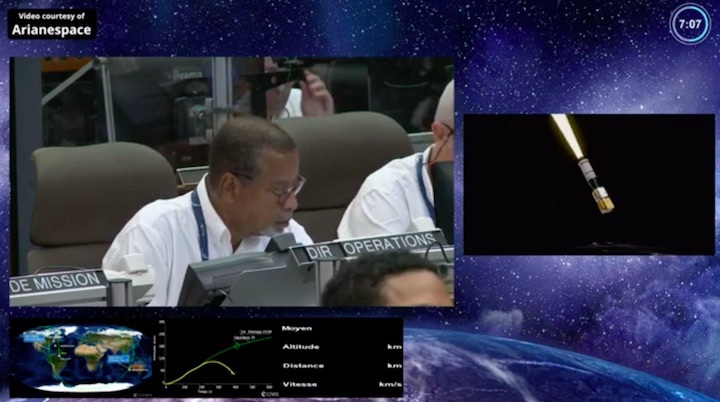4.03.2023

On Tuesday 20 December 2022, Arianespace announced the loss of the Vega-C VV22 mission after its launch at 22h47 local time in French Guiana (2h47 CET/1h47 GMT on 21 December 2022). The mission was carrying two payloads, Pléiades Neo 5 and 6 Earth observation satellites for Airbus Defence and Space.
Arianespace (the launch service provider) and the European Space Agency (ESA – the launch system development authority) immediately set up an Independent Enquiry Commission, which concluded that after the nominal functioning of the Vega-C first stage P120C and nominal ignition of the second stage (Zefiro 40), a progressive decrease in the chamber pressure was observed 151 seconds after lift-off, leading to the loss of the mission.
The Independent Enquiry Commission tasked with analysing the loss of the Vega-C Flight VV22 mission, shared its findings in a briefing on 3 March. Watch the replay: media briefing on the loss of of the Vega-C Flight VV22 mission.
Initial investigations, conducted right after the launch with the available flight data, confirmed that the launcher’s sub-systems reacted to the events as designed, and that the cause of the failure was a gradual deterioration of the Zefiro 40’s nozzle. More precisely, the Commission confirmed that the cause was an unexpected thermo-mechanical over-erosion of the carbon-carbon (C-C) throat insert of the nozzle, procured by Avio in Ukraine. Additional investigations led to the conclusion that this was likely due to a flaw in the homogeneity of the material.
The anomaly also revealed that the criteria used to accept the C-C throat insert were not sufficient to demonstrate its flightworthiness. The Commission has therefore concluded that this specific C-C material can no longer be used for flight. No weakness in the design of Zefiro 40 has been revealed. Avio is implementing an immediate alternative solution for the Zefiro 40’s nozzle with another C-C material, manufactured by ArianeGroup, already in use for Vega’s Zefiro 23 and Zefiro 9 nozzles.
Considering the nature of the VV22 anomaly, the Commission emphasizes that its conclusions on Zefiro 40 do not affect the Vega launcher which is relying on the Zefiro 23 and Zefiro 9 motors. In this context, Arianespace decided to adapt its launch schedule to reassign a mission to one of its two remaining Vega launchers with a targeted launch date before the end of summer 2023.
The Independent Enquiry Commission has formulated a series of recommendations aiming at restoring confidence in the Vega and Vega-C launcher systems through the establishment of robust recovery plans to ensure a reliable return to flight and robust commercial exploitation.
The main strands of work based on the recommendations are:
- To complement the findings of the Commission with additional testing and analysis in order to ensure the robustness of the qualification of the alternative C-C material selected for Zefiro 40;
- To implement an additional qualification phase of the Zefiro 40 engine with the alternative C-C material;
- To implement a set of actions, aiming at guaranteeing a long-term reliable and sustainable launcher production.
A task force steered by ESA and Arianespace has started implementing the roadmap proposed by the Commission and will thoroughly follow the implementation of the actions by Vega’s prime contractor Avio, in order to ensure a reliable and robust return to flight of Vega-C. The targeted launch date is end of 2023.
ESA, as launch system qualification authority, Arianespace, as launch service provider and Avio, as design authority and prime contractor of the Vega launcher, will join their efforts to achieve the common objective of a robust exploitation of the Vega launch system, for the benefit of their institutional and commercial customers.
Josef Aschbacher, ESA Director General, said: "The Independent Enquiry Commission stands for ESA’s commitment to the highest safety standards. It has drawn a set of recommendations that once implemented should ensure a robust, reliable return to flight of the Vega-C launcher.
ESA will fully engage its engineering and project management expertise to support Avio in the implementation of actions required to regain confidence in the launcher system. Restoring Europe’s independent access to space is ESA’s priority, and I am therefore glad that we can proceed with Vega launch campaigns while preparing Vega-C to safely return to flight."
“Thanks to their hard work, the members of the Commission have identified the immediate cause of the loss of the mission VV22 and of its lessons learnt, and proposed the relevant corrective actions,” said Stéphane Israël, CEO of Arianespace. “Their recommendations already are under implementation by Avio, under the supervision of Arianespace and ESA, in order to allow a successful return to flight of Vega-C and to guarantee its continuous reliability.”
Quelle:ESA
